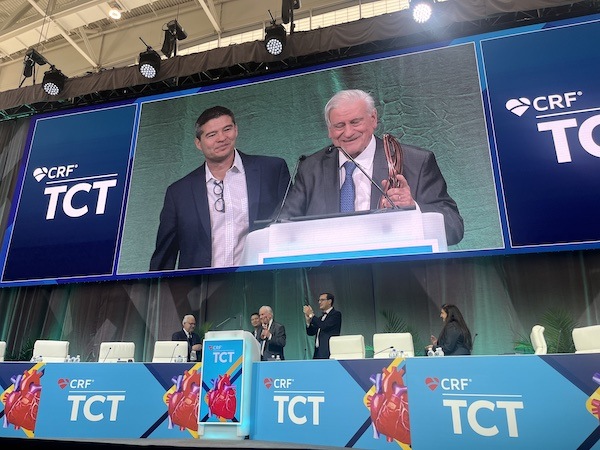
The major contribution of Valentin Fuster (Mount Sinai Health System, New York, USA) to the field of cardiovascular medicine has been recognised at the 2022 Transcatheter Cardiovascular Therapeutics meeting (TCT, 16–19 September, Boston, USA), where he has been honoured with the TCT Career Achievement Award.
Fuster was presented with the accolade in front of a packed crowd at TCT’s Clinical Science and Endovascular Theater by Juan Granada, chief executive officer and president of the Cardiovascular Research Foundation (CRF), who paid tribute to Fuster’s inspirational work, alongside Fuster’s colleague Roxana Mehran (Icahn School of Medicine at Mount Sinai, New York, USA), who said his “impact on human life has been profound”.
Ever humble, Fuster paid tribute to colleagues, and crucially his wife, for their support in his work.
Fuster is a world-renowned figure in the field of cardiology. He has 35 worldwide honorary degrees and is the most highly cited Spanish research scientist of all time, according to Google Scholar.
Fuster has received three of the most important awards from the National Institutes of Health and is the only cardiologist to have received the highest awards for research from the four leading international cardiology organizations: the American College of Cardiology, American Heart Association (AHA), European Society of Cardiology, and Interamerican Society of Cardiology. He recently received Thailand’s Prince Mahidol Award in the field of Medicine, and this year, the AHA established the “Valentin Fuster Award for Innovation in Science” in his honour, naming him the first recipient.
He is currently editor-in-chief of the Journal of the American College of Cardiology (JACC), and is a past president of both the AHA and the World Heart Federation.
Fuster was among the contributors to the first day of the TCT 2022 meeting where he spoke on connections between vascular disease and cognitive dysfunction.










